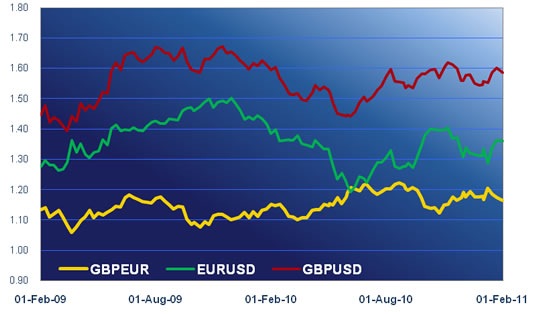An unpopular leader yesterday received an overdue beating after years in power, losing control of part of the country. Citizens, angry at the way the regime has spent their money on quixotic and grandiose schemes, said enough is enough. So much for the Hamburg state election. Over on this side of the North Sea attention is turning to next month’s census, courtesy of an advertising campaign to “raise awareness”. This year’s census will temporarily employ about 35,000 people and will probably be the last of its kind. The paper-based system is too cumbersome and not enough people take it seriously. For the 2021 census they are thinking of getting all the data from Nectar.
| Technical levels | |||||||||||||
|
|||||||||||||
| Economic releases | |||||||||||||
|
|||||||||||||
No loyalty cards were involved in the collection of Friday’s data but they will have accrued more points than analysts had expected. UK retail sales increased by 1.9% in January, more than offsetting December’s downwardly-revised -1.4% fall and generating a year-on-year increase of 5.3%. Sterling reacted positively, jumping half a cent higher against the dollar and the euro.
Against the yen, the US dollar and the commodity dollars it managed to hold onto its gains for the rest of the day, despite another disappointing figure of 41k mortgage approvals in January. The only other statistics were those for Canadian inflation, which was very slightly lower than forecast at 2.3%.
The euro needed no help from the Euroland data, which was just as well because there weren’t any. What it did have, though, was a comment from Bini Smahgi. No, he is not one of Gaddafi’s lieutenants, Lorenzo Bini Smaghi is a member of the European Central Bank’s executive committee. Bloomberg quoted him as saying the ECB might need to raise interest rates if global inflationary pressures increase. “It is a key challenge for monetary policy to avoid spillovers and maintain inflation expectations in check,” he said, “this requires the ability to take pre-emptive actions if needed.” Although Mr Smaghi’s is just one vote among 23 in the ECB governing council his position on the six-person executive board evidently lent his comment an ex cathedra status. Never mind that even as he spoke the ECB was doling out another €16 billion in emergency overnight lending to Euroland banks or that it was having to buy Portuguese government debt to keep the five-year rate down to 7.09%: investors were far more taken by Mr Bini Smaghi’s observation that rising inflation implies higher interest rates. The euro leapt half a cent higher. Compared with Friday morning it opens in London today a cent stronger against the US dollar and half a cent better against the pound.
The G20 meeting in Paris had nothing new or exciting to say about currencies, just the usual platitudes about “enhancing exchange rate flexibility”. It is all rather meaningless unless China signs up. Beijing refused to subscribe to a proposal that would have used exchange rates as one indicator of economic imbalance.
Sterling got off to a good start this morning when figures from estate agents’ website Rightmove showed that would-be house sellers are hoping to get 3.1% more for their property this month than they were looking for a year ago. Between January and February they raised their asking prices by 0.3%. Rightmove itself seems resigned to the idea that sellers are being unrealistic. Its spokesperson, Miles Shipside, admitted that 530k mortgages were written in 2010 while 1.3 million new properties were added to Rightmove’s list. Mr Shipside expects a very similar picture to unfold this year. But never mind, the index is up by an annual 3.1% so it’s good for sterling.
There is not a whole lot more on today’s agenda. Germany and Euroland offer up their purchasing managers’ indices for manufacturing and services but they will lack context until Britain and the States reveal their own numbers. IFO’s survey of business confidence and expectations might attract some interest but more likely will not. President’s Day (a.k.a. Washington’s Birthday) takes the United States out of the equation so it will be a more illiquid and less active afternoon than usual. That does not necessarily mean nothing will happen after lunch – illiquidity can sometimes result in higher volatility – but that is what it will probably mean.






